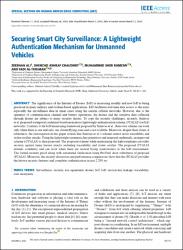| dc.contributor.author | Ali, Zeeshan | |
| dc.contributor.author | Chaudhry, Shehzad Ashraf | |
| dc.contributor.author | Ramzan, Muhammad Sher | |
| dc.contributor.author | Al-Turjman, Fadi | |
| dc.date.accessioned | 2020-05-02T01:40:48Z | |
| dc.date.available | 2020-05-02T01:40:48Z | |
| dc.date.issued | 2020 | en_US |
| dc.identifier.issn | 2169-3536 | |
| dc.identifier.uri | https://hdl.handle.net/11363/2121 | |
| dc.description.abstract | The significance of the Internet of Drones (IoD) is increasing steadily and now IoD is being practiced in many military and civilian-based applications. IoD facilitates real-time data access to the users especially the surveillance data in smart cities using the current cellular networks. However, due to the openness of communication channel and battery operations, the drones and the sensitive data collected through drones are subject to many security threats. To cope the security challenges, recently, Srinivas et al. proposed a temporal credential based anonymous lightweight authentication scheme (TCALAS) for IoD networks. Contrary to the IoD monitoring framework proposed by Srinivas et al., their own scheme can work only when there is one and only one cluster/fiying zone and is not scalable. Moreover, despite their claim of robustness, the investigation in this paper reveals that Srinivas et al.'s scheme cannot resist traceability and stolen verifier attacks. Using the lightweight symmetric key primitives and temporal credentials, an improved scheme (iTCALAS) is then proposed. The proposed scheme while maintaining the lightweightness provides security against many known attacks including traceability and stolen verifier. The proposed iTCALAS extends scalability and can work when there are several fiying zone/clusters in the IoD environment. The formal security proof along with automated verification using ProVerif show robustness of proposed iTCALAS. Moreover, the security discussion and performance comparisons show that the iTCALAS provides the known security features and completes authentication in just 2:295 ms | en_US |
| dc.description.sponsorship | Funding Agency: Deanship of Scientific Research (DSR), King Abdulaziz University, Jeddah
Grant Number: D-480-611-1441
This work was supported by the Deanship of Scientific Research (DSR), King Abdulaziz University, Jeddah, under Grant D-480-611-1441. | en_US |
| dc.language.iso | eng | en_US |
| dc.publisher | IEEE-INST ELECTRICAL ELECTRONICS ENGINEERS INC, 445 HOES LANE, PISCATAWAY, NJ 08855-4141 USA | en_US |
| dc.relation.isversionof | 10.1109/ACCESS.2020.2977817 | en_US |
| dc.rights | info:eu-repo/semantics/openAccess | en_US |
| dc.rights | Attribution-NonCommercial-NoDerivs 3.0 United States | * |
| dc.rights.uri | http://creativecommons.org/licenses/by-nc-nd/3.0/us/ | * |
| dc.subject | Surveillance | en_US |
| dc.subject | security | en_US |
| dc.subject | key-agreement | en_US |
| dc.subject | drones | en_US |
| dc.subject | IoT | en_US |
| dc.subject | IoD | en_US |
| dc.subject | session key leakage | en_US |
| dc.subject | traceability | en_US |
| dc.subject | user anonymity | en_US |
| dc.subject | KEY AGREEMENT SCHEME | en_US |
| dc.subject | USER AUTHENTICATION | en_US |
| dc.subject | POWER ANALYSIS | en_US |
| dc.subject | INTERNET | en_US |
| dc.subject | THINGS | en_US |
| dc.subject | NETWORKS | en_US |
| dc.subject | PROTOCOL | en_US |
| dc.subject | DEVICES | en_US |
| dc.title | Securing Smart City Surveillance: A Lightweight Authentication Mechanism for Unmanned Vehicles | en_US |
| dc.type | article | en_US |
| dc.relation.ispartof | IEEE ACCESS | en_US |
| dc.department | Mühendislik ve Mimarlık Fakültesi | en_US |
| dc.authorid | https://orcid.org/0000-0002-9321-6956 | en_US |
| dc.identifier.volume | 8 | en_US |
| dc.identifier.startpage | 43711 | en_US |
| dc.identifier.endpage | 43724 | en_US |
| dc.relation.publicationcategory | Makale - Uluslararası Hakemli Dergi - Kurum Öğretim Elemanı | en_US |



















